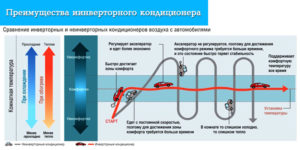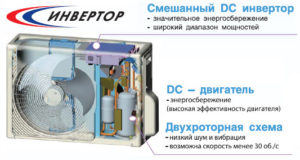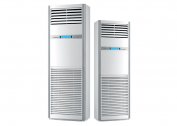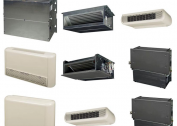Scientific and technological progress with enviable frequency offers new home appliances that surpass the old models in operational and technical characteristics. There are two types of split systems on the market: conventional and inverter. By the principle of operation, they practically do not differ from each other, because they use a refrigeration heat extraction system.
The principle of operation of the split system
Before you decide which is better - inverter split system or conventional, you need to understand how the air conditioner works. Purely structurally, these are two blocks: external and internal.
- compressor,
- a condenser, it's a heat exchanger,
- fan, cooling condenser,
- dehumidifier
- expansion valve.
In the indoor unit:
- evaporator,
- centrifugal fan
- bath for collecting condensate.
The principle of operation of the refrigeration unit is the ability of freon (refrigerant) to take thermal energy out of the surrounding air. The refrigeration system itself does not produce cold. Its task is to create conditions under which the refrigerant would accept the vapor phase of its physical state.
Freon in the form of steam is located in the evaporator located in the indoor unit. This tube-fin device is blown by a fan, which drives low-temperature air into the premises, obtained at the junction of the air mass and the evaporator.
Further, the refrigerant passes through the compressor, where its pressure increases, and is driven into the condenser. Here the reverse process occurs - freon gives its thermal energy to the outside air, whose temperature is lower. In this case, the condenser device is blown by a fan to increase the heat transfer efficiency.
The next step is drying the refrigerant. To do this, it enters the dehumidifier, where it is separated from moisture. Then he goes to the expansion valve. Here, freon passes through a special nozzle with a wider hole. Due to this, the refrigerant pressure drops, which leads to the transition again into a gaseous state. And in this form, he enters the evaporator again. After that, the process is repeated.
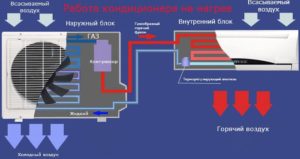 Split systems operate in winter-summer mode. When the device switches to heating, the reverse process begins: the evaporator becomes a condenser, and the external heat exchanger acts as an internal one. In order for the entire system to switch to “winter” mode, the air conditioner uses a four-way valve, which switches the movements of the refrigerant.
Split systems operate in winter-summer mode. When the device switches to heating, the reverse process begins: the evaporator becomes a condenser, and the external heat exchanger acts as an internal one. In order for the entire system to switch to “winter” mode, the air conditioner uses a four-way valve, which switches the movements of the refrigerant.
According to this principle, all air conditioning systems work. The inverter air conditioner differs from the non-inverter approach to lowering the temperature regime of cooling or heating the premises.
Differences of the inverter type air conditioner from the usual
Ordinary air conditioning operates on the following technology:
- the temperature in the room is monitored by a sensor, the response range of which is set using the remote control;
- as soon as the air temperature inside the room drops to the required temperature sensor sends a signal to the compressor;
- the latter is disconnected from the power supply;
- as soon as the temperature rises above the set temperature, the sensor sends another signal to turn on the compressor.
The on-off range is 3-5C. The compressor and the entire refrigeration system operate in the maximum permissible modes, which leads to overheating and a decrease in the operating life. In addition, when the air conditioner is turned on, its power increases three times.An overvoltage appears in the electrical network, which negatively affects other household appliances and lighting equipment.

Turning the system on and off is cyclical work. Since freon is pumped through the elements in a uniform flow, after turning off the compressor, 50% of its volume remains in the high pressure zone, the other half in the low zone. After switching on, a specially installed throttle system can normalize the pressure. But she is only responsible for her functions. In this case, the refrigerant can boil anywhere, not only in the evaporator, for example, in a connecting pipe or receiver. As a result, until the pressure is restored in the zones, the cold is lost.
The difference between the inverter split system and the usual one is that the device never turns off if the air conditioner is constantly working. To reduce the efficiency of heat removal from indoor air, you just need to reduce its speed. This can be done in one way - to reduce the voltage of the supply current from the network.
The air conditioner increases or decreases the frequency of the mains. With decreasing voltage, the number of revolutions of the compressor motor decreases, respectively, the performance of the latter decreases. The electric motor responds to the readings and signal of the temperature sensor. In this case, the response range is greatly reduced - from 1 to 1.5C.
When the indoor temperature reaches the required value, the compressor motor slows down to 5-10% of the nominal value. In this case, the evaporation temperature of the refrigerant decreases gradually, increasing the period of operation of the air conditioner in "sleep" mode. This is an additional energy saving.
Advantages and disadvantages of inverter split systems
To decide which air conditioner to choose: inverter or conventional, it is important to know the pros and cons of an inverter type split system.
| Benefits | Explanations | disadvantages | Explanations |
| Save energy by 30%. | The compressor operating mode is uninterrupted. Conventional split systems, when turned on, consume three times more electricity than during stable operation, because the starting power increases three times. It is called the launcher. | Power surges adversely affect the operation of the inverter air conditioner. | The compressor, which is designed to operate in stable conditions and smooth voltage switching, reacts negatively to sudden changes - it crashes faster. |
| Long-term operation and high reliability. | The reason is the smooth operation of the compressor. However, conventional split systems in all respects do not differ from inverter ones due to the parts and assemblies made of high-strength materials used in the designs. | Expensive repair. | This applies to the compressor machine. Here you can add the failure of electronic boards. Practice shows that it is better to purchase a new conventional air conditioner than to repair an inverter. It will cost almost the same amount. |
| It is quiet. | The characteristic is based on research with special instruments. The human ear cannot distinguish whether the inverter air conditioner is quieter or not compared to conventional ones. But if we consider this purely constructively, it all depends on the fan, which is installed behind the evaporator. | High price. | The difference between the cost of an inverter air conditioning system and a conventional one is approximately 40%. |
| It can work at temperatures up to -15C. | In this case, it is necessary to indicate how effective this work will be. Will the inverter split system be able to heat a room with the required temperature regime? As practice shows, low temperatures outside cool the refrigerant too much, which simply does not have time to take in enough cold from the air in the rooms. |
Thus, we can note two characteristics of the inverter air conditioner, which will encourage buyers to choose this model.The first is a modern approach to the implementation of new solutions in terms of energy saving. The second is the constant voltage in the network, which will preserve the integrity of other household appliances and lamps.
Reviews
When choosing an air conditioner, for some reason, my husband and I decided to purchase an inverter version. Probably have read various information about this modification. In the process, no differences were found, it seems everything is the same as with the usual one. They say that it makes less noise, and it seems that the usual old one, which stands in another room, also works. So in my opinion, in vain overpaid.
Sergey, Vladivostok:
I knew about inverters before, but there was no need to purchase an air conditioner until I built a summer house. Here I decided: I’ll buy a new tricked out one. After a season of operation, I can say the following: if the voltage in the network is normal and does not jump, this is the best option. If the jumps are sensitive, you have to buy UPS. Regular expenses. As for saving electricity consumption, I can’t say anything, there’s nothing to compare with.
